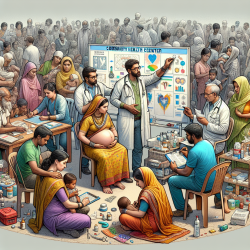In the realm of maternal health, hypertensive disorders of pregnancy (HDP) pose a significant threat, contributing to a substantial number of maternal deaths worldwide. In low- and middle-income countries like India, the scarcity of healthcare professionals exacerbates this issue. A promising solution lies in task-sharing with community health workers (CHWs), as explored in the study "The feasibility of task-sharing the identification, emergency treatment, and referral for women with pre-eclampsia by community health workers in India."
The Study: A Closer Look
This groundbreaking study was conducted in Karnataka, India, focusing on the potential for CHWs to take on roles traditionally reserved for more highly trained healthcare professionals. By empowering CHWs to identify and provide initial care for women with HDP, the study aimed to bridge gaps in healthcare delivery and reduce maternal mortality rates.
Community Support and Concerns
The study revealed strong community support for CHWs conducting home visits to monitor blood pressure among pregnant women. However, concerns were raised regarding the training and effectiveness of these workers. The acceptance of CHWs administering oral antihypertensives and magnesium sulphate in emergencies was mixed, with medical practitioners emphasizing the need for emergency transport to higher facilities.
Overcoming Barriers
The primary barriers identified were insufficient training, limited medication availability, and doubts about the accuracy of blood pressure devices used by CHWs. Addressing these challenges is crucial for successful task-sharing implementation.
Training and Supervision
Ensuring comprehensive training and ongoing supervision is vital. CHWs must be equipped with reliable tools and knowledge to perform their duties effectively. Regular refresher courses can help maintain high standards of care.
Community Engagement
Engaging the community is essential for building trust in CHWs' capabilities. By involving local leaders and decision-makers in training programs and discussions, communities can become more supportive of task-sharing initiatives.
The Potential Impact
If implemented successfully, task-sharing can significantly enhance maternal healthcare by providing timely interventions and reducing the burden on overworked healthcare systems. This approach not only optimizes resource use but also empowers CHWs to play a critical role in their communities.
Encouraging Further Research
This study highlights the potential benefits of task-sharing but also underscores the need for further research to refine strategies and address challenges. Practitioners are encouraged to explore innovative approaches that integrate CHWs into broader healthcare frameworks.
Conclusion
The findings from this study offer valuable insights into how task-sharing can transform maternal healthcare in resource-limited settings. By investing in training, supervision, and community engagement, we can empower CHWs to deliver life-saving care to women at risk of HDP.
To read the original research paper, please follow this link: The feasibility of task-sharing the identification, emergency treatment, and referral for women with pre-eclampsia by community health workers in India.










